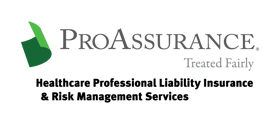The fear of litigation and shame associated with making a mistake can be paralyzing for health care professionals. However, remaining silent and isolated from the patient can increase physician distress when it conflicts with the physician’s perceptions of the ethical and moral duties associated with disclosure. This can exacerbate second victim syndrome—shame, anger, depression, inadequacy, loss of confidence—which is well documented among physicians who are involved in unanticipated outcomes and is a contributing factor in physician burnout. While patients should be the focus of disclosure, it is also important to consider the benefits of disclosure for physicians. Research indicates that disclosure may help physicians process the emotions associated with an unanticipated outcome and can increase physician/provider well-being.
Increasing patient well-being and decreasing liability risk exposure are key benefits of disclosure. Education and mentoring assists clinicians in approaching difficult disclosure discussions. Openness and compassion can help clinicians work through their own difficult emotions.

Disclosure Tools
Physicians in every medical specialty at every level of experience face unanticipated outcomes to medical treatment. Thankfully, there are tools available that can help physicians respond to these difficult situations.
NORCAL Group Resource: Disclosure of Unanticipated Outcomes
This resource document provides strategies to help physicians approach their response to unanticipated outcomes in an organized way using NORCAL’s process, “Nine Steps to Respond to Unanticipated Outcomes.”
NORCAL Group Webinar: Responding to Unanticipated Outcomes in Patient Care
Like the document above, this webinar includes information that can help physicians approach their response to an unanticipated outcome in an organized way.
NORCAL Group Claims Rx: Responding to Unanticipated Outcomes: First Conversations
This article provides strategies for early conversations with the patient following an unanticipated outcome.
Communication and Optimal Resolution (CANDOR)
The Agency for Healthcare Research and Quality (AHRQ) presents a patient-centered, proactive approach that emphasizes early disclosure and fair resolution following an unexpected outcome.
The Benefits of Disclosure
Disclosure encourages a culture of transparency. There are ethical and practical arguments in favor of disclosure.
The Best Response to Medical Errors? Transparency encourages an open and non-defensive approach to disclosure of medical errors, which also promotes clinical improvement.
Overcoming Barriers to Disclosure
In addition to the emotional toll on a physician, a threat of a malpractice suit may also be a barrier to disclosure.
Barriers to Medical Error Disclosure: An Organizing Framework and Themes for Future Research discusses four barriers to full and effective disclosure, including sanctions, culture, attitudes, and personal preference.

